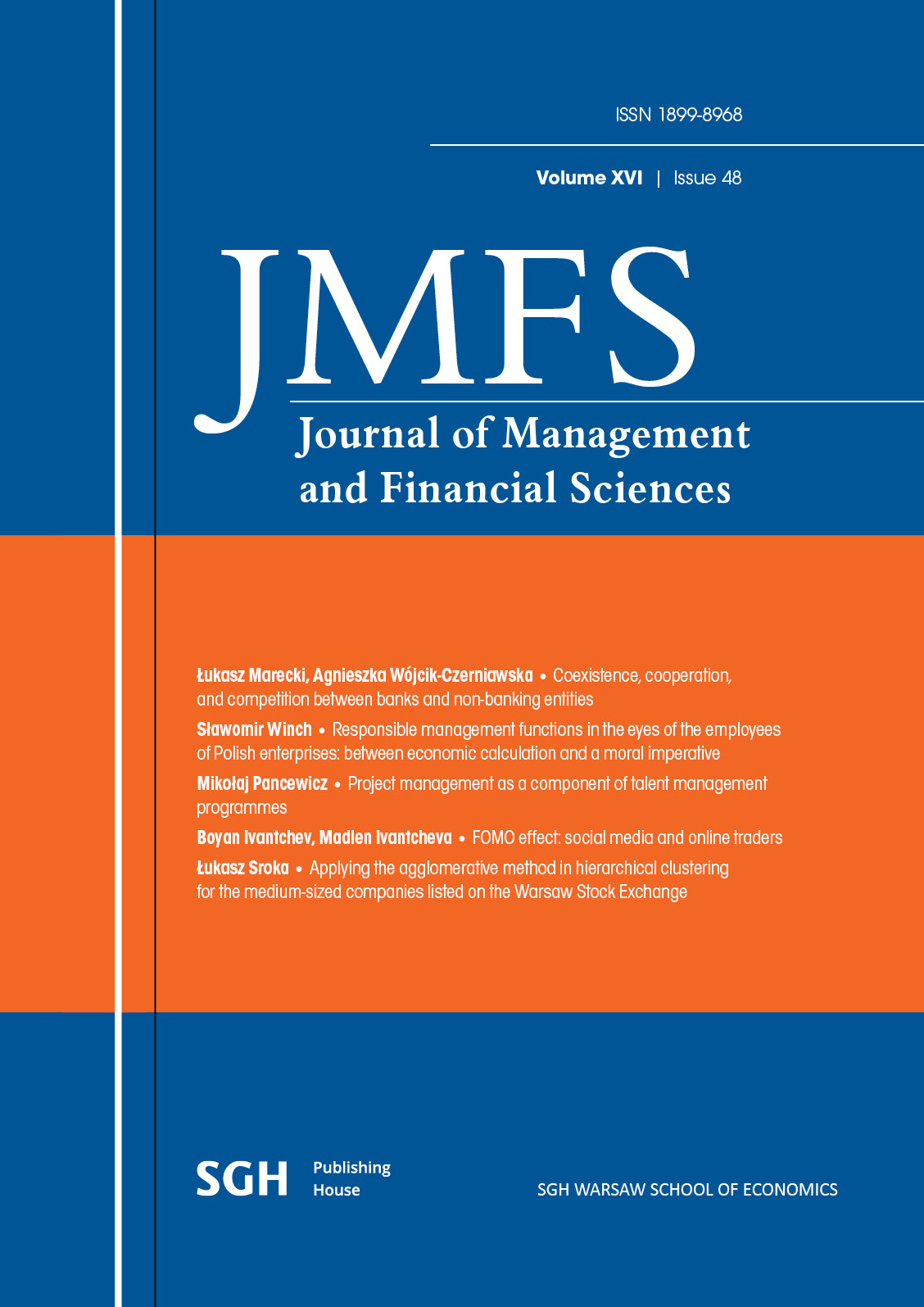Project management as a component of talent management programmes
Main Article Content
Abstract
The aim of the article is to explore the poorly researched phenomenon of the use of projects as a talent development tool within talent management programmes. The author conducted a literature scoping review to examine the state of knowledge on the use of projects and project management in talent management programmes. The author identified 7 articles that address the research question. The literature review confirmed that the phenomenon exists, but it is poorly researched. Factors influencing the effectiveness and efficiency of using projects in talent management were identified, conclusions were drawn regarding the potential impact of talent management on projects carried out within talent management programmes and a preliminary conceptualization of the relationships between projects and talent management programmes was presented. This study may serve as a basis for planning field studies exploring talent management programmes that use projects as one of the tools for employee development.
Downloads
Article Details

This work is licensed under a Creative Commons Attribution 4.0 International License.
References
Ariss, A. A., Cascio, W. F., Paauwe, J. (2014). Talent management: Current theories and future research directions. Journal of World Business, 49 (2), pp. 173–179.
Arksey, H., O’Malley, L. (2005). Scoping studies: towards a methodological framework. International Journal of Social Research Methodology, 8 (1), pp. 19–32, https://doi.org/10.1080/1364557032000119616
Caligiuri, P., Mencin, A., Jayne, B., Traylor, A. (2019). Developing cross-cultural competencies through international corporate volunteerism. Journal of World Business, 54 (1), pp. 14–23. Scopus, https://doi.org/10.1016/j.jwb.2018.09.002
Conine, T. E., Peratoner, B. C., Cuozzo, P. J., Hoskins, T. F. (2020). Enhancing experiential learning through business simulation and emulation: TBC Corporation creates competitive advantage. Global Business and Organizational Excellence, 39 (3), pp. 6–16, https://doi.org/10.1002/joe.21998
Foulon, M., Handfield-Jones, H., Chambers, E. G., Hankin, S. M., Michaels III, E. G. (1998). The War for Talent. The McKinsey Quarterly, 3.
Gallardo-Gallardo, E., Dries, N., González-Cruz, T. F. (2013). What is the meaning of ‘talent’ in the world of work? Human Resource Management Review, 23 (4), pp. 290–300, https://doi.org/10.1016/j.hrmr.2013.05.002
Glen, C. (2007). Fostering talent opportunity: getting past first-base. Strategic Direction, 23 (10), pp. 3–5, https://doi.org/10.1108/02580540710824220
Groves, K. S. (2007). Integrating leadership development and succession planning best practices. Journal of Management Development, 26 (3), pp. 239–260.
Hatch, M. J., Cunliffe, A. L. (2013). Organization Theory. Modern, Symbolic and Postmodern Perspectives. Oxford University Press.
Ingram, T. (2016). Zarządzanie talentami i pracownikami w dojrzałym wieku w kontekście wpływu na wyniki przedsiębiorstwa. Wydawnictwo Uniwersytetu Ekonomicznego w Katowicach.
Ingram, T. (Ed.), Majowska, M., Musiał-Kondziela, J., Rutkowska, M., Strużyna, J., Zabłocki, P. (2011). Zarządzanie talentami. Teoria dla praktyki zarządzania zasobami ludzkimi. Polskie Wydawnictwo Ekonomiczne.
Jacobsson, M., Jałocha, B. (2021). Four images of projectification: an integrative review. International Journal of Managing Projects in Business, 14 (7), pp. 1583–1604, https://doi.org/10.1108/ijmpb-12-2020-0381
Jałocha, B. (2019). Projektyzacja jako przedmiot badań w ramach studiów nad projektami. Przegląd Organizacji, pp. 34–41. https://doi.org/10.33141/po.2019.08.05
Järvi, K., Khoreva, V. (2020). The role of talent management in strategic renewal. Employee Relations: The International Journal, 42 (1), pp. 75–89, https://doi.org/10.1108/er-02-2018–0064
Juchniewicz, M. (2019). Doskonalenie działalności projektowej w organizacji. Oficyna Wydawnicza SGH – Szkoła Główna Handlowa w Warszawie.
Kaliannan, M., Darmalinggam, D., Dorasamy, M., Abraham, M. (2023). Inclusive talent development as a key talent management approach: A systematic literature review. Human Resource Management Review, 33 (1), p. 100926, https://doi.org/10.1016/j.hrmr.2022.100926
Maresova, P., Soukal, I., Svobodova, L., Hedvicakova, M., Javanmardi, E., Selamat, A., Krejcar, O. (2018). Consequences of Industry 4.0 in Business and Economics. Economies, 6 (3), p. 46, https://doi.org/10.3390/economies6030046
Nieto-Rodriguez, A. (2021). Project Management Handbook. How to Launch, Lead, and Sponsor Successful Projects. Harvard Business Review Press.
Pachura, A. (2019). Talents, projects and management – attempt at synthesis. Polish Journal of Management Studies, 19 (1), pp. 271–282, https://doi.org/10.17512/pjms.2019.19.1.21
PMI. (n.d.). PMI Talent Triangle. PMI Talent Triangle Update. Retrieved from: https://www.pmi.org/certifications/certification-resources /maintain/pmi-talent-triangle-update [accessed:29.01.2023].
PMI. (2014). Talent management. Powering strategic initiatives in the PMO. Project Management Institute Thought Leadership Series Report. Retrieved from: https://www.pmi.org/learning/thought-leadership/series/talent-management/powering-strategic-initiatives-pmo
Praktyki w zarządzaniu talentami w Polsce (2015). House of Skills. Retrieved from: https://www.houseofskills.pl/wp-content/uploads/ 2021/09/Raport- Praktyki-w-zarzadzaniu-talentami-w-Polsce_final_01.02.2016-1.pdf
Skuza, A., Woldu, H. G., Alborz, S. (2022). Who is talent? Implications of talent definitions for talent management practice. Economic and Business Review, 8 (22), pp. 136–162, https://doi.org/10.18559/ebr.2022.4.7
Sońta-Drączkowska, E. (2012). Zarządzanie wieloma projektami. Polskie Wydawnictwo Ekonomiczne.
Stuss, M. M. (2021). Zarządzanie talentami. Koncepcje, modele i praktyki. Wydawnictwo Uniwersytetu Jagiellońskiego.
Tansley, C. (2011). What do we mean by the term “talent” in talent management? Industrial and Commercial Training, 43 (5), pp. 266–274, https://doi.org/10.1108/00197851111145853
Thunnissen, M., Arensbergen, P. V. (2015). A multi-dimensional approach to talent. An empirical analysis of the definition of talent in Dutch academia. Personnel Review, 44 (2), pp. 182–199. Scopus, https://doi.org/10.1108/pr-10-2013-0190
Trocki, M., Juchniewicz, M. (2022). Ład Projektowy Organizacji (Project Governance). Koncepcje, problemy, rozwiązania. Oficyna Wydawnicza SGH.
Ulrich, D., Smallwood, N. (2012). What is talent? Leader to Leader, 63 (63), pp. 55–61, https://doi.org/10.1002/ltl.20011
